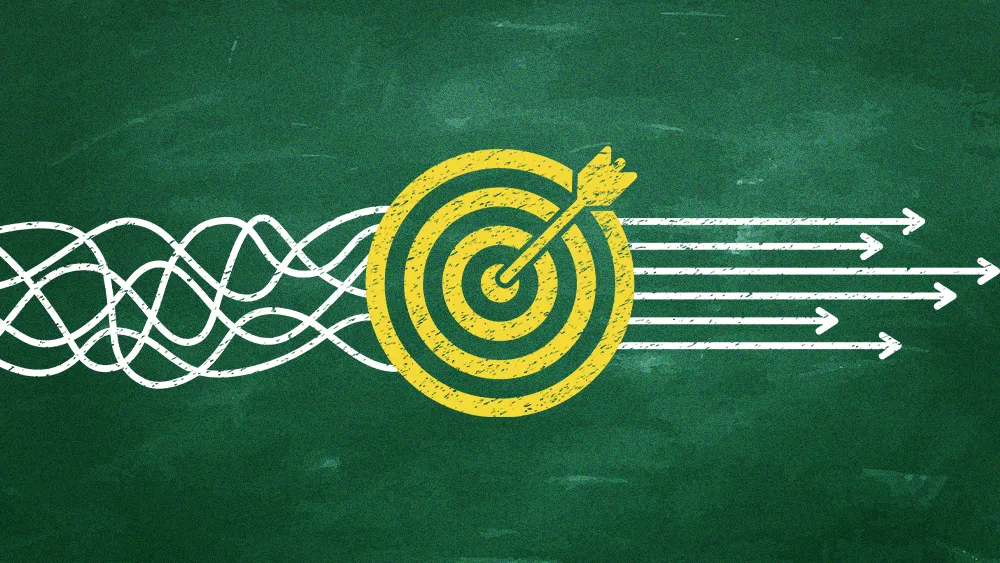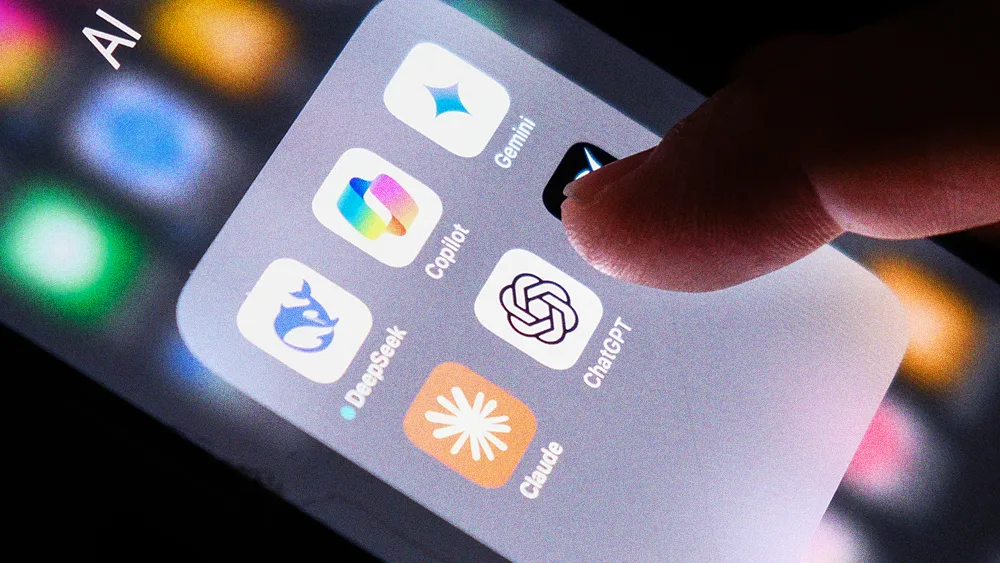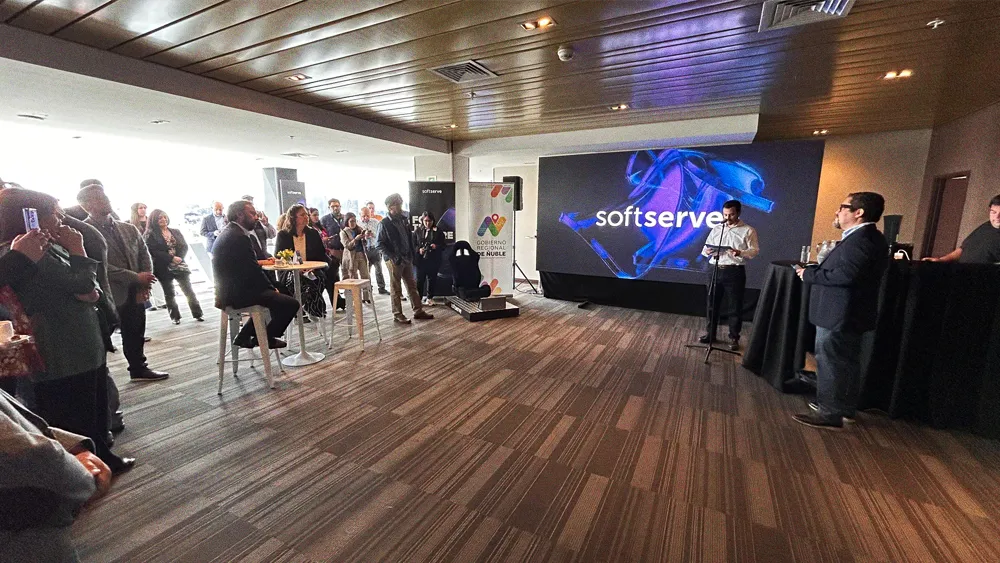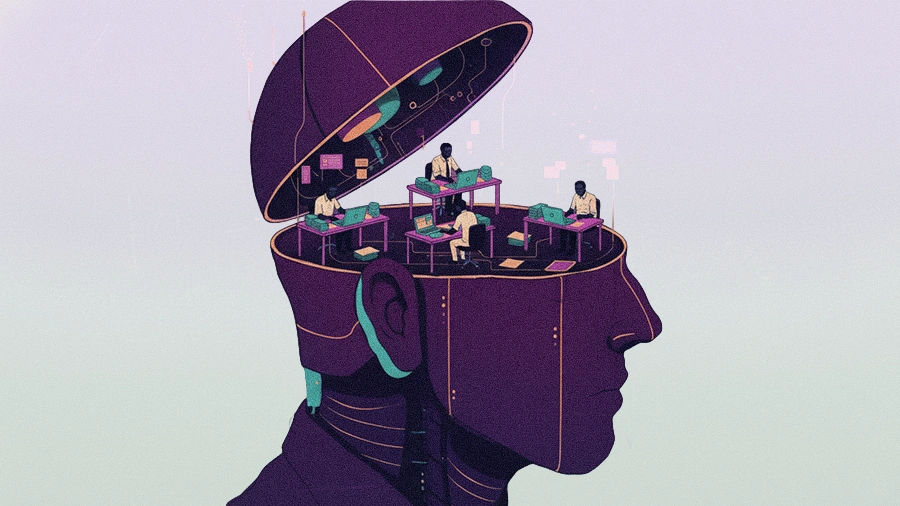Embracing digital’s ‘third wave’ as AI comes for middle management

Key Points
AI is the third wave of digital disruption, forcing companies to rethink how work is organized and value is measured.
Deepali Vyas, Global Data & AI Sector Leader at ZRG Partners, explains that as AI automates execution, the most valuable human skills are strategy, empathy, and judgment.
Vyas predicts traditional jobs will evolve into “portfolios,” with professionals building careers by stacking skills, stories, and strategic value from a variety of roles.
This shift will redefine professional loyalty from company-based to mission-based, making the “human differentiator” the ultimate competitive advantage.
The task-oriented outputs once owned by middle management, like reporting, analysis, approvals, are being replaced by AI co-pilots. So what remains? Strategy, empathy, and judgment. That's the stuff that AI can't do.

Deepali Vyas
Global Data & AI Sector Leader
ZRG Partners
As companies still grapple with AI adoption and its impact on org design, one HR leader argued the most immediate and profound shift isn’t happening in the C-suite or at entry level. It’s collapsing middle management.
We spoke with Deepali Vyas, the Global Data & AI Sector Leader at ZRG Partners, LLC, who specializes in placing C-suite and senior leadership talent to drive this transformation. With previous experience as the Global Head of the Data, AI, and FinTech Practice at Korn Ferry and a sector leader at Heidrick & Struggles, Vyas argued that organizations must move beyond fear-based narratives of replacement and embrace a strategic redesign of work itself.
“The task-oriented outputs once owned by middle management, like reporting, analysis, and approvals, are being replaced by AI co-pilots,” Vyas said. “So what remains? It’s strategy, empathy, and judgment. That’s the stuff that AI can’t do. It’s not as smart as human ingenuity.” This shift, Vyas explained, is the third great wave of technological disruption, following the dot-com boom of the early 2000s and the big data era of the 2010s. This time, the driving force of change is a pervasive sense of corporate FOMO around AI readiness.
The third wave: Even more than the dot com boom and big data eras before it, the AI age spurred change at an unprecedented rate, redefining roles and reallocating positions of power seemingly overnight. “We’re creating this class of translators,” Vyas explained. “The new value lies in connecting business problems to AI solutions. People who can bridge the gap between prompt engineering and process design are indispensable.”
Enable, don’t replace: Vyas argued using AI purely for cost-cutting is dangerously shortsighted. The strategic imperative is to use AI to augment human capability, not just eliminate headcount. “Don’t think, ‘I’m going to replace people with AI and reduce costs,'” Vyas warned. “Instead, consider how you can make your organization AI-enabled to be more productive, get the most out of your people, and really get an edge on your competitors.”
To illustrate this, Vyas pointed to a previous disruption the recruiting industry faced a decade prior. As LinkedIn’s popularity surged, many predicted the end of the recruiting profession. Instead, it automated the low-level task of finding candidates, which in turn made the uniquely human skills of assessment, relationship-building, and storytelling more valuable than ever. “Now, I use LinkedIn every day as a recruiter,” she said. “We’re dealing with the same situation with AI.”
In this new landscape, Vyas identified a few skills that will define irreplaceable talent over the next five years.
Critical thinking: “You have to think critically in order to gain some signal from all of that noise,” she explained. “Data is everywhere, but how will you optimize it?” This is an area where AI struggles, but human brains excel. Adding context and making decisions based on the data are crucial skills in today’s workplace.
Tech-augmented creativity: Technology is only as good as the information you feed it. To get the best outputs right now, you need to work alongside AI, constantly iterating to get a great result. “AI can generate stuff, but you have to elevate it,” Vyas explained. “The edge is who can co-create with machines.”
Brand and reputation management: She also predicated that trust, storytelling, and reputation will be more important than ever in a future workplace that rewards skills and experiences over traditional career paths. “Your resume will be replaced by a digital footprint. A strong personal brand is the new superpower,” Vyas claimed.
This new reality demands a new kind of professional, one measured not by the tasks they complete but by the value they create. Vyas’ vision for the future is one of smaller, flatter, and smarter teams built around outcomes, not hierarchy. “Titles and tenure will matter less,” she declared. “It’s going to be about trust and traction. AI will handle execution, so humans will be measured by impact.”
This shift will redefine the very nature of a career. She envisioned professionals building “multi-revenue lives,” mixing full-time roles with fractional work, consulting, and content creation, much like a multi-hyphenate celebrity. “Jobs will become portfolios,” Vyas forecasted. “You will stack skills, stories, and strategic value from all types of opportunities.”
The ultimate result of this transformation is a powerful new archetype. “We’re going to redefine loyalty from company-based to mission-based,” she said. “The human differentiator becomes the only differentiator.” For Vyas, this is not a theory but a personal reality. “My value comes from my lived experience,” she said. “I can serve lots of companies and clients at the same time without being tied to one specific role.”
In this future, elite talent may operate more like professional athletes, represented by agents who broker “brand deals” for their skills on high-impact projects. It’s a future where human traits like judgment, creativity, and connection become the workplace currency. Augmented by AI, of course.
Jobs will become portfolios. You will stack skills, stories, and strategic value from all types of opportunities. Titles and tenures won't matter as much as impact.

Deepali Vyas
Global Data & AI Sector Leader
ZRG Partners
Jobs will become portfolios. You will stack skills, stories, and strategic value from all types of opportunities. Titles and tenures won't matter as much as impact.

Deepali Vyas
Global Data & AI Sector Leader
ZRG Partners
Related articles
TL;DR
AI is the third wave of digital disruption, forcing companies to rethink how work is organized and value is measured.
Deepali Vyas, Global Data & AI Sector Leader at ZRG Partners, explains that as AI automates execution, the most valuable human skills are strategy, empathy, and judgment.
Vyas predicts traditional jobs will evolve into “portfolios,” with professionals building careers by stacking skills, stories, and strategic value from a variety of roles.
This shift will redefine professional loyalty from company-based to mission-based, making the “human differentiator” the ultimate competitive advantage.

Deepali Vyas
ZRG Partners
Global Data & AI Sector Leader

Global Data & AI Sector Leader
As companies still grapple with AI adoption and its impact on org design, one HR leader argued the most immediate and profound shift isn’t happening in the C-suite or at entry level. It’s collapsing middle management.
We spoke with Deepali Vyas, the Global Data & AI Sector Leader at ZRG Partners, LLC, who specializes in placing C-suite and senior leadership talent to drive this transformation. With previous experience as the Global Head of the Data, AI, and FinTech Practice at Korn Ferry and a sector leader at Heidrick & Struggles, Vyas argued that organizations must move beyond fear-based narratives of replacement and embrace a strategic redesign of work itself.
“The task-oriented outputs once owned by middle management, like reporting, analysis, and approvals, are being replaced by AI co-pilots,” Vyas said. “So what remains? It’s strategy, empathy, and judgment. That’s the stuff that AI can’t do. It’s not as smart as human ingenuity.” This shift, Vyas explained, is the third great wave of technological disruption, following the dot-com boom of the early 2000s and the big data era of the 2010s. This time, the driving force of change is a pervasive sense of corporate FOMO around AI readiness.
The third wave: Even more than the dot com boom and big data eras before it, the AI age spurred change at an unprecedented rate, redefining roles and reallocating positions of power seemingly overnight. “We’re creating this class of translators,” Vyas explained. “The new value lies in connecting business problems to AI solutions. People who can bridge the gap between prompt engineering and process design are indispensable.”
Enable, don’t replace: Vyas argued using AI purely for cost-cutting is dangerously shortsighted. The strategic imperative is to use AI to augment human capability, not just eliminate headcount. “Don’t think, ‘I’m going to replace people with AI and reduce costs,'” Vyas warned. “Instead, consider how you can make your organization AI-enabled to be more productive, get the most out of your people, and really get an edge on your competitors.”
To illustrate this, Vyas pointed to a previous disruption the recruiting industry faced a decade prior. As LinkedIn’s popularity surged, many predicted the end of the recruiting profession. Instead, it automated the low-level task of finding candidates, which in turn made the uniquely human skills of assessment, relationship-building, and storytelling more valuable than ever. “Now, I use LinkedIn every day as a recruiter,” she said. “We’re dealing with the same situation with AI.”
In this new landscape, Vyas identified a few skills that will define irreplaceable talent over the next five years.
Critical thinking: “You have to think critically in order to gain some signal from all of that noise,” she explained. “Data is everywhere, but how will you optimize it?” This is an area where AI struggles, but human brains excel. Adding context and making decisions based on the data are crucial skills in today’s workplace.
Tech-augmented creativity: Technology is only as good as the information you feed it. To get the best outputs right now, you need to work alongside AI, constantly iterating to get a great result. “AI can generate stuff, but you have to elevate it,” Vyas explained. “The edge is who can co-create with machines.”
Brand and reputation management: She also predicated that trust, storytelling, and reputation will be more important than ever in a future workplace that rewards skills and experiences over traditional career paths. “Your resume will be replaced by a digital footprint. A strong personal brand is the new superpower,” Vyas claimed.

Deepali Vyas
ZRG Partners
Global Data & AI Sector Leader

Global Data & AI Sector Leader
This new reality demands a new kind of professional, one measured not by the tasks they complete but by the value they create. Vyas’ vision for the future is one of smaller, flatter, and smarter teams built around outcomes, not hierarchy. “Titles and tenure will matter less,” she declared. “It’s going to be about trust and traction. AI will handle execution, so humans will be measured by impact.”
This shift will redefine the very nature of a career. She envisioned professionals building “multi-revenue lives,” mixing full-time roles with fractional work, consulting, and content creation, much like a multi-hyphenate celebrity. “Jobs will become portfolios,” Vyas forecasted. “You will stack skills, stories, and strategic value from all types of opportunities.”
The ultimate result of this transformation is a powerful new archetype. “We’re going to redefine loyalty from company-based to mission-based,” she said. “The human differentiator becomes the only differentiator.” For Vyas, this is not a theory but a personal reality. “My value comes from my lived experience,” she said. “I can serve lots of companies and clients at the same time without being tied to one specific role.”
In this future, elite talent may operate more like professional athletes, represented by agents who broker “brand deals” for their skills on high-impact projects. It’s a future where human traits like judgment, creativity, and connection become the workplace currency. Augmented by AI, of course.




